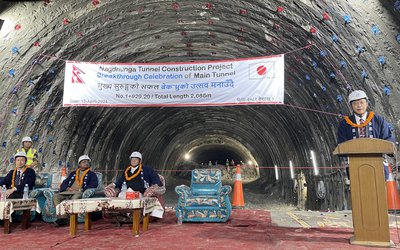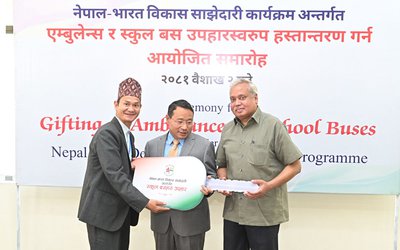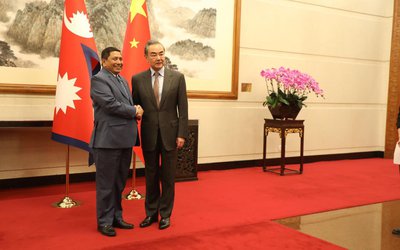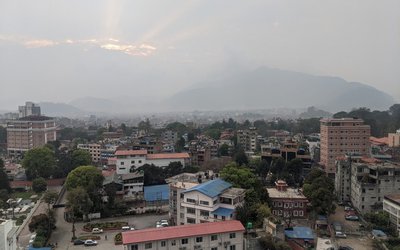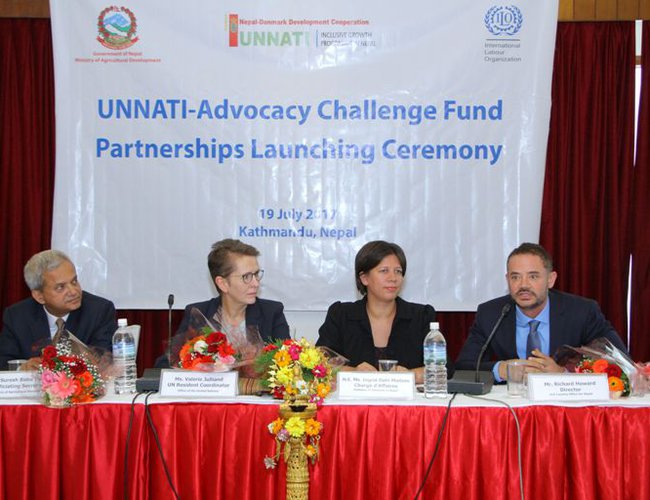
It is my great pleasure to join you today to celebrate the partnership launching between the ILO Country Office for Nepal and 30 Advocacy Challenge Fund Grantees under the larger UNNATI Program, funded by the Danish Government. We appreciate the cooperation of the Danish Government for reaching out to the people of Nepal through so many partners.
Agriculture provides livelihood for three-fourths of the Nepali population. It accounts for around one-third of the country’s Gross Domestic Product. It is our hope the UNNATI Program will be instrumental in enhancing the capacity of farmers, workers and agriculture entrepreneurs in the four value chains - orthodox tea, ginger, dairy and cardamom - in eastern Nepal where the Program is operational. The UNNATI program has a large role to play in contributing to the national objectives set by the government to support Nepal in graduating from the least developed countries category.
UNNATI means progress or prosperity in Nepali, and the UNNATI program is of special importance to the UN System. We have two UN agencies jointly collaborating to support this effort - the ILO, who are implementing the Advocacy for Rights and Good Corporate Governance project and the UNCDF, who are implementing the Access to Finance project to achieve the collected result of strengthening market-based growth.
As part of the framework, the UNCDF provides support for creating new opportunities for value chain actors. Their efforts help increase access to micro-finance and investment capital that in turn help financial service providers reach poorer households and small businesses through an inclusive finance approach.
Similarly, the ILO provides support through the Challenge Fund mechanisms that engages value chain actors such as - workers’ and employers’ organizations, associations, media and NGOs to advocate at national level through inclusive dialogues for more effective policies. Stronger policy coherence results in higher productivity, decent jobs and an improvement in workers’ lives. It also helps bring together tripartite constituents for social dialogue to improve an enabling environment for inclusive growth.
But a singular effort is not enough – tapping into the resources of multinational and national enterprises, who are key drivers of globalization, can also play a role in affecting the working and living conditions of people worldwide. Working with these actors can contribute to poverty reduction, respect for human and labour rights, deepen the values of governance and support green and inclusive growth.
As Nepal works toward “leaving no one behind” in its implementation of the SDGs, this is the time to ensure “Decent work for All”, and ILO’s Fundamental Principles and Rights at Work is instrumental in ensuring decent work for All. When some groups are “left behind” or excluded, this undermines growth and destabilizes social and political harmony. But decent work puts money in the pockets of individuals and their families. It gives them purchasing power that fuels the growth and development of sustainable enterprises, especially smaller businesses, who in turn hire more workers and improve their pay and working conditions. It also helps governments to receive more tax revenues, which leads to increased social protection.
As we celebrate the collaboration between the ILO and its implementing partners under UNNATI program, I wish them great success and long lasting, sustainable partnerships beyond the life of the UNNATI program.


